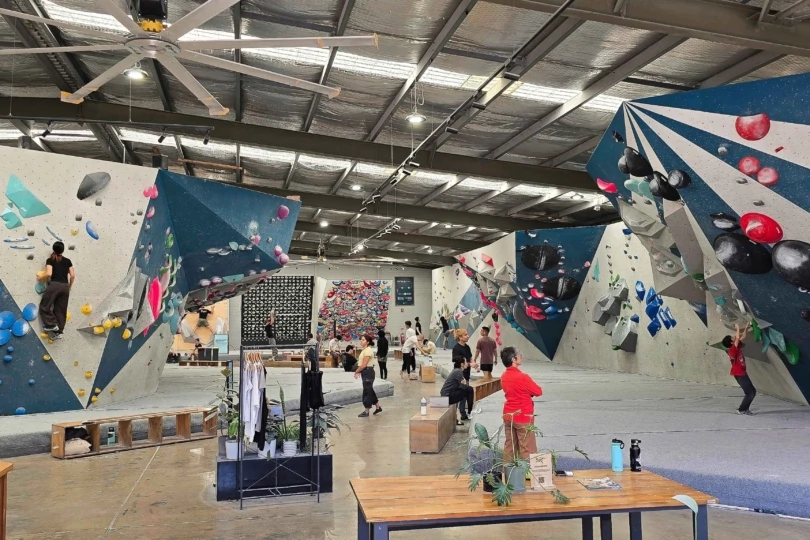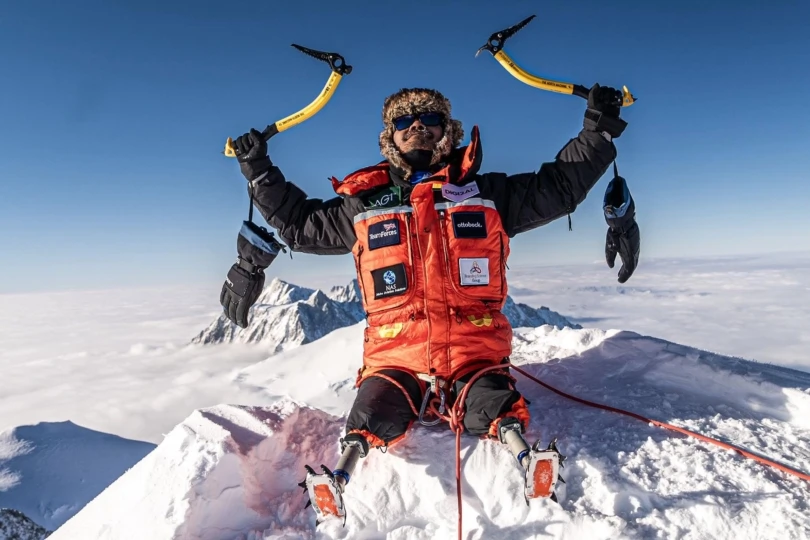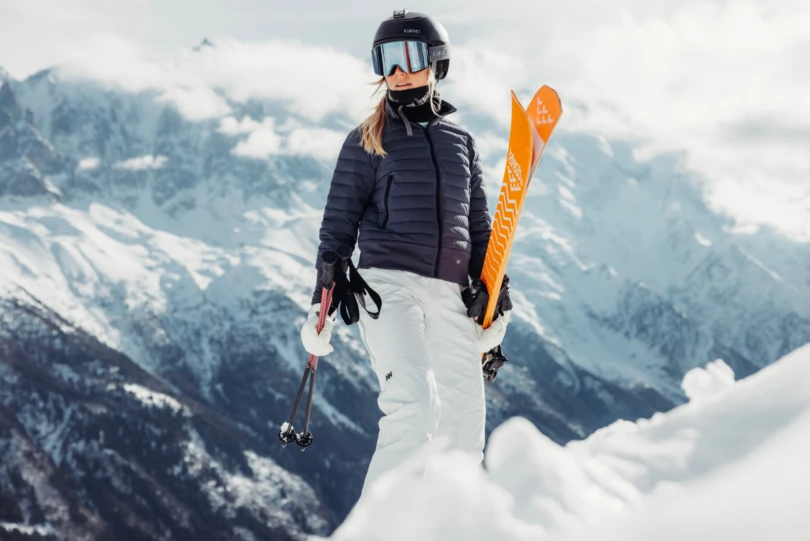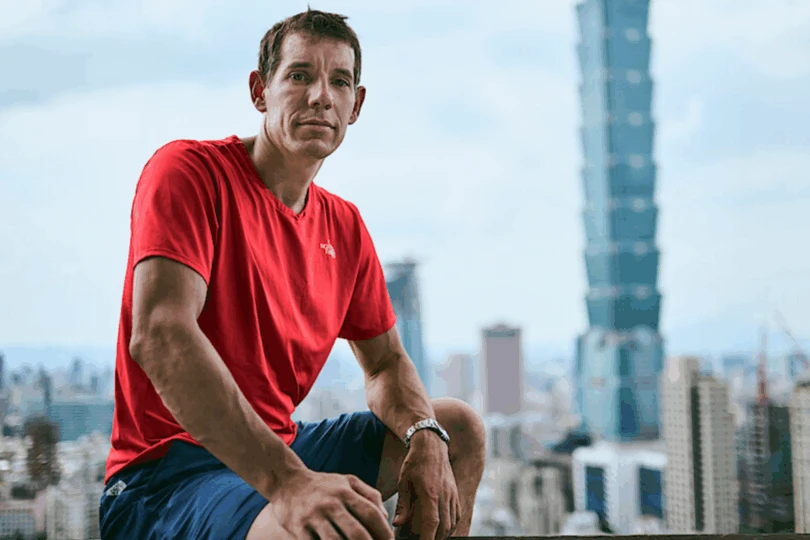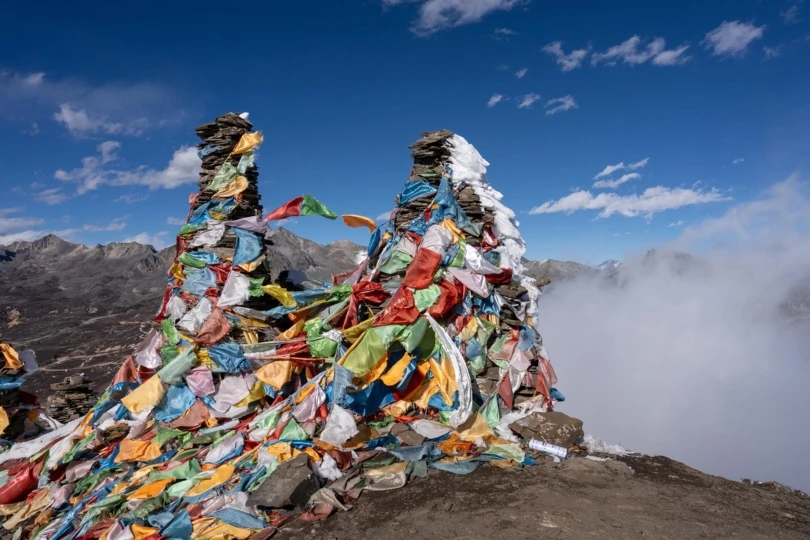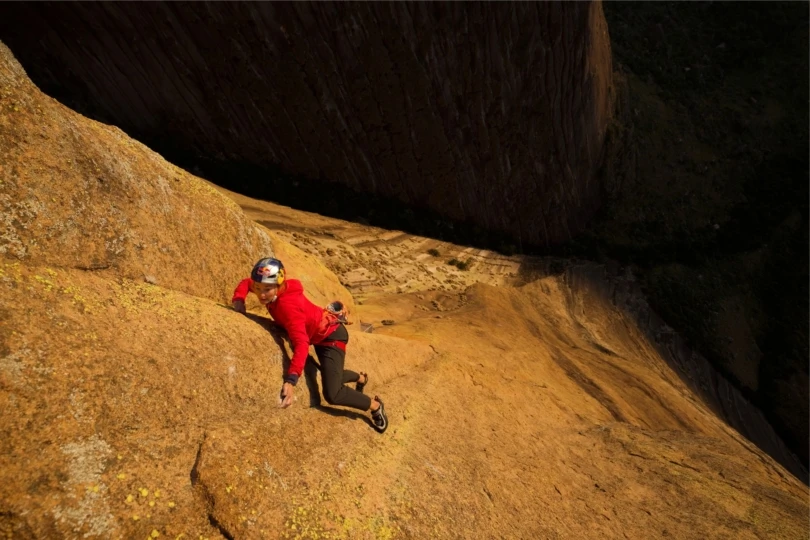As the IFSC Paraclimbing Lead World Cup season wrapped up in Switzerland, Lead and Speed World Cups got rolling in France.
The past week was a busy one for the IFSC and an exciting one for climbing fans around the world. Not only did the organization put on the Paraclimbing Lead event in Villars, but it also hosted Lead and Speed competitions in neighboring Chamonix.
Adam Ondra found success in his first competitive appearance of the season, and Janja Garnbret clinched yet another win. Also notably, Kiromal Katibin managed to break the speed climbing record he set last week, and several fresh faces gathered on the podium.
Here’s a wrap on this year’s Lead and Speed World Cups in France as well as the Paraclimbing Lead World Cup finale in Switzerland.
IFSC Lead World Cup Chamonix
The third lead competition of the season went down July 9-10 at the base of the world-famous Mont Blanc. Seventeen climbers competed in the finals round, where fan favorites reigned supreme.
Scoring Lead Climbing: How It Works
Lead rounds feature a single sport route that is 15 m (roughly 50 feet) tall and overhanging. Each hold on the route corresponds to a number, with 1 being the closest to the ground. Regulations limit competitors to a single attempt per round; if they fall, their attempt is over. A qualifying round comes first, followed by a semifinal and final.
The climber that reaches the highest hold without falling earns the highest score in each round. Performance in all three rounds factors into final scores. If multiple climbers reach the same height and tally the same score after all three rounds, the climber who records the fastest overall time (rounded to the lowest second) wins.
Women’s Lead Competition

Olympians crowded the podium in the women’s lead event on Sunday.
Hot off her 50th podium finish last week in Villars, Slovenia’s Garnbret showed no signs of slowing down in Chamonix. The Olympic gold medalist managed to top every single route put before her this week, from qualifying rounds through to the final. In so doing, Garnbret claimed her third consecutive lead win this season and the 35th World Cup gold of her career.
The 23-year-old is the winningest competitive climber — man or woman — of all time. She’s a two-time Lead World Champion, two-time Boulder World Champion, and two-time Combined World Champion.
Italy’s Laura Rogora was hot on Garnbret’s heels in the final round, also finding the top of the route. To break the tie, officials compared both climbers’ performances from previous rounds. The analysis landed Rogora with a proud silver. It’s the 21-year-old Olympian’s first medal of the year and fourth career podium.
South Korea’s Chaehyun Seo also managed to top out the final route out, securing bronze as a result of her performance in the semifinal. Chamonix marks her second podium finish this season — she took second behind Garnbret in Innsbruck 2 weeks ago. The 18-year-old took the Lead World Champion title by a landslide in 2019.

Women’s Results
- Janja Garnbret (SLO): Top
- Laura Rogora (ITA): Top
- Chaehyun Seo (KOR): Top
- Jessica Pilz (AUT): Top
- Natsuki Tanii (JPN): 45+
Men’s Lead Competition

In stark contrast to the women’s final, not a single climber found the top of the men’s route on Sunday night. The route lent itself to few climbers and managed to force most of the field off around the halfway point.
Ondra eked out gold in his IFSC season debut. The Olympian and new dad managed a score of 39+. It would appear that Ondra’s regimen of ticking the hardest sport climbs in the world has proven useful. Sunday night’s victory marks the 29-year-old’s 37th World Cup podium.
“I definitely needed a break after the Olympics, but now I feel it’s the time — I got hungry for competitions. I think I picked up the best Lead World Cup on the circuit, which is Chamonix, and it was a great decision — I enjoyed climbing here,” he said following his performance.
Coming off his first career IFSC win last week, Japan’s Taisei Homma took silver in a narrow race. The silver medalist also attained a score of 39+ in the final round, but his semifinal performance landed him in second.
Rounding out the podium was American Sean Bailey with a score of 29+. It’s the 26-year-old’s first medal this year but the third podium appearance for the U.S. men’s team. Americans Colin Duffy and Jesse Grupper both claimed medals in Innsbruck and Villars but fell short of making the final round in Chamonix.

Men’s Results
- Adam Ondra (CZE): 39+
- Taisei Homma (JPN): 39+
- Sean Bailey (USA): 29+
- Luka Potocar (SLO): 29+
- Yannick Flohe (GER): 29+
IFSC Speed World Cup Chamonix
Another world record in the men’s speed competition and more Chinese dominance at the podium were the themes at the Speed event in Chamonix.
Scoring Speed Climbing: How It Works

The scoring for speed climbing is different but pretty simple. In the qualification round, climbers get two attempts to scale the 15m wall and log their fastest time. The route is an international standard and does not change between any competition or round. Times then determine the climbers’ final ranking, first through 16th place.
In the finals round, the top-ranked climber will race against the bottom (or 16th) seed, the second seed goes against the 15th, the third seed goes against the 14th, etc. The winners from each race move on to the next round, where the climber in first place races the one in eighth, second against seventh, etc.
Once four climbers remain, they get to duke it out for the podium. First- and second-place climbers compete in the “big” final, while third- and fourth-place climbers compete in the “small” final.
Women’s Speed Competition

China’s Lijuan Deng defended her gold medal position with an accelerated time of 6.55 seconds in the women’s final round, setting a new Asian record. It’s Deng’s second World Cup gold on the circuit — she claimed her first one last weekend in Villars.
Poland’s Aleksandra Kalukca, who hit the pad in the big final with 6.64 seconds on the clock, clinched silver. It’s a new personal best for Kalucka and her fifth medalling performance overall.
Bronze belonged to Indonesia’s Desak Made Rita Kusuma Dewi, who outran her compatriot Rajiah Sallsabillah in the small final with a time of 6.82 seconds. It’s Made Rita Kusuma Dewi’s second bronze after having taken third in Villars.

Women’s Results
- Lijuan Deng (CHN)
- Aleksandra Kalukca (POL)
- Desak Made Rita Kusuma Dewi (INA)
- Rajuah Sallsabillah (INA)
- Guizhen Xie (CHN)
Men’s Speed Competition

In what’s become something of an expectation, Indonesia’s Kiromal Katibin broke his own speed record for the fifth time since May 2021. The 21-year-old came ever so close to smashing the 5-second barrier with his time of 5.009 seconds in the qualifying round.
In the final, China’s Jinbao Long claimed gold with his time of 5.11 seconds in the big final. It’s the second consecutive podium appearance for Long and a notable improvement on his bronze performance in Villars.
Spain’s Erik Noya Cardona took silver and his second-ever World Cup medal, running 5.49 seconds in the men’s big final.
In the men’s small final, Indonesia’s Aspar Aspar claimed bronze over his teammate Veddriq Leonardo. Aspar climbed to the top in 5.53 seconds, claiming the seventh World Cup medal of his career.
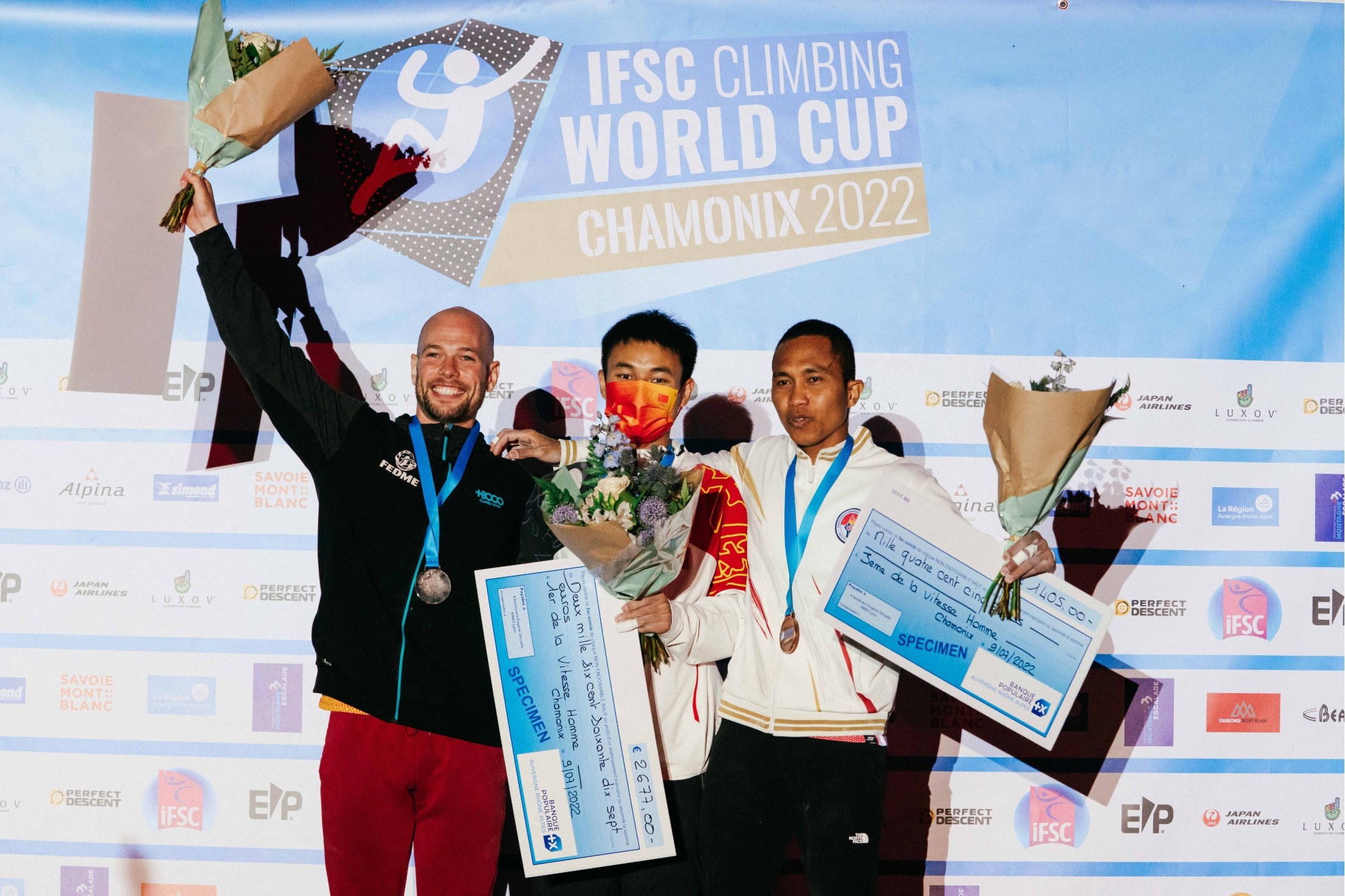
Men’s Results
- Jinbao Long (CHN)
- Erik Noya Cardona (ESP)
- Aspar Aspar (INA)
- Veddriq Leonardo (INA)
- Liang Zhang (CHN)
IFSC Paraclimbing World Cup Villars

The final paraclimbing competitions of the season took place at Villars’ Place du Rendez-Vous from July 8 through 9. Team France proved victorious, taking home its fourth gold of the season. In all, 17 nations took to the podium in 2022.
The finale featured several divisions of competition based on athletes’ disabilities; see a brief rundown of each one below. Scoring is similar to that of lead climbing, in that the climber who reaches the highest marker on the route wins.
For more details and rules, visit paraclimbing.org/classification.
- Blind Sport Classes
- B1: Athletes with visual acuity poorer than 2.6 LogMAR
- B2: Athletes with visual acuity between 1.5 and 2.6 LogMAR and/or visual field less than 10 degrees
- B3: Athletes with visual acuity between 1.0 and 1.4 LogMAR and visual field between 10 and 40 degrees
- Amputee Classes
- AU1: Athletes with 1 functioning arm
- AU2: Athletes with 1 functioning arm and 1 forearm amputation or equivalent limb deficiency
- AL1: Athletes who are wheelchair dependent, with no usable function from the waist down
- AL2: Athletes with at least 1 legal amputation or equivalent limb deficiency. They may choose to climb with a prosthesis or not
- Limited Reach, Power, or Stability Classes
- RP athletes may have very different categories of impairments: hypertonia, ataxia, athetosis, impaired passive range of motion, impaired muscle power, and short stature. Some athletes of lower RP classes need a wheelchair while others are limited by other factors (flexibility, coordination, strength).
Women’s Paraclimbing Competitions

Female paraclimbers had competitions in the B2, B3, AU2, AL2, RP1, and RP3 classes.
Blind Classes
In B2, Great Britain’s Abigail Robinson claimed gold with a score of 60+ on the women’s B2 lead route. Germany’s Edith Scheinecker secured silver at marker 45, and Italy’s Nadia Bredice took bronze with a 21+.
B3 showcased four female finalists and an incredibly tight competition — all four reached hold 45. France’s Roxane Heili managed to tag the 45+ and thus take gold. Silver and bronze came down to the fastest time, with Romania’s Ionela Grecu clinching second and France’s Melissa Cesarone taking third.
Amputee Classes
In AU2, France’s Solenne Piret became the only woman to reach the top of the final route, thus claiming gold. Italy’s Lucia Capocilla took second with a score of 37+, and America’s Giovanna Dubuc took third with 16+.
In AL2, France’s Lucie Jarrige reigned supreme yet again: the four-time world champ topped the final route. Australia’s Sarah Laracombe managed silver with 39+, followed by Hannah McFadden of the U.S. with 33+.
Limited Reach, Power, or Stability Classes
In RP1, not a single climber topped the route, but Austria’s Jasmin Plank claimed a decisive gold, reaching the 47+ mark. Silver went home with America’s Melissa Ruiz, who scored 35+, followed closely by the bronze-taker, Spain’s Marta Peche Salinero, with a score of 35.
The RP3 event rounded out the women’s paraclimbing competitions. In her third podium show of the season, Germany’s Rosalie Schaupert took gold in Villars, notching a 62+ in the finale. Britain’s Leanora Volpe took silver with 54+, followed by the Netherlands’ Christiane Luttikhuizen with 53+.
Men’s Paraclimbing Competitions

Male paraclimbers had competitions in the B1, B2, B3, AU2, AL1, AL2, RP1, RP2, and RP3 classes.
Blind Classes
In B1, Japan’s Sho Aita secured gold with a score of 47 on the final route, followed by Spain’s Francisco Javier Aguilar Amoedo with 39 and Romania’s Razvan Nedu with 36.
In men’s B2, Britain’s Richard Slocock claimed gold as he reached the 30+ mark on the final lead route. Spain’s Raul Simon Franco landed silver with 29, and his compatriot Guillermo Pelegrin Gomez took bronze with a score of 28.
In B3, Romania’s Cosmin Florin Candoi found tops in every round from qualifications through the final. His superlative performance earned him a dominant gold. Britain’s Lux Losey Sail also found the top in the final round, earning silver with a slightly slower time than Candoi. Canada’s Chaz Misuraca, who scored 33+, earned bronze.
Amputee Classes
In AU2, Germany’s Kevin Bartke tagged the 62+ marker in the finals to secure victory. It’s his third consecutive win and quite a season finale for the German. Norway’s Isak Ripman took silver with a score of 49+, followed by French climber Erwan Lievin who took bronze with 33+.
In men’s AL1, Austria ruled the podium. Angelino Zeller climbed an unparalleled final, reaching the 51st mark on the lead wall. Markus Posendorfer took home silver, scoring 33. And Daniel Kontsch closed out the podium with a score of 26+.
In AL2, France’s Julien Gasc secured another gold medal for his country, scoring 41+ on the final route. Belgium’s Frederik Leys took silver with a score of 32, followed by Spain’s Albert Guardia Ferrer, who reached the 30-mark to take bronze.
Limited Reach, Power, or Stability Classes
In men’s RP1, Germany’s Korbian Franck claimed his third World Cup gold by reaching the 43+ mark in the finals. Italy’s Gian Matteo Ramini came in second, tagging 33+. Germany’s Tim Schaffrinna followed in third, reaching the 27-mark.
In men’s RP2, the U.S.’ Benjamin Mayforth took gold, notching a score of 42+ in the finals. Israel’s Mor Michael Sapir scored 41+ to claim silver. India’s Manikandan Kumar, who scored 37+, followed as the bronze medalist.
And finally, in men’s RP3, the Netherlands’ Jamie Barendrecht made his third podium appearance of the year with his gold-medaling final score of 42+. Slovakia’s Andrej Harsany swooped in for silver with a score of 26, followed by France’s Bastien Thomas who scored 23+ in the final round.




